May 22nd, 2013 by JJW
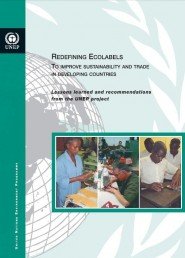
In 2012, at the invitation of the United Nations Development Programme (UNEP) Sustainable Consumption and Production branch, I had the pleasure of interviewing and working with dozens of stakeholders from over a dozen countries to explore how ecolabels are encouraging sustainable development and improving international trade opportunities. The report “Redefining ecolabels to improve sustainability and trade in developing countries: Lessons learned and recommendations from a UNEP project” explores both the history and background of ecolabelling as a tool to promote sustainable production and consumption and to evaluate a specific five-year UNEP project.
You can download the report here on the new (and very informative) Sustainable Production and Consumption Clearinghouse.
More about this report from the introduction:
This report aims to evaluate to what extent the project succeeded in reaching its intended goals, to draw lessons learned, and present recommendations for future actions. The report contains four major sections. Section I introduces readers to ecolabels and the differences between different information systems, provides an overview of how these systems are used in developed and developing countries as well as introduces the major challenges, opportunities, and debates around voluntary labelling and standards globally.
Section I also traces the debates about ecolabels as possible barriers to trade. This includes possible implications of recent World Trade Organization cases and other issues affecting the discussions on Technical Barriers to Trade, and the relevance of this UNEP project to the debates, including the importance of working with established rules, practices, and disciplines that avoid unnecessary barriers in developing and using internationally-accepted ecolabels.
Section II introduces the UNEP ‘Enabling developing countries to seize ecolabelling opportunities’ project and partners, and the assessment methodology.
Section III of this report focuses on the assessment of the project results in relation to its goals. This section is based on interviews with key stakeholders in the project, as well as background research. It reviews the project as a whole, including a sector and country analysis. It describes the baseline situations and major developments that happened during the five years of the project.
Section IV provides lessons learned and recommendations to project partners and other stakeholders on further improvement and future projects. Suggestions are targeted toward all stakeholders involved in the ecolabelling field.
The report’s methodology is based on the compilation and review of all project documents and relevant literature on trade and ecolabels. It also involved interviews with participants from the project, including funders, implementing bodies, country partners, and some target enterprises when available.
July 27th, 2012 by JJW
I don’t usually post media like this on my blog, but this video from my colleagues at Rainforest Alliance is too powerful to be ignored. Credible sustainability standards and labels with third party certification help you know what you’re buying so you can be assured the products you buy are not harming the people or the ecology.
Fight deforestation, fight climate change. from Rainforest Alliance on Vimeo.
Video taken from the Rainforest Alliance website. See the accompanying article here.
January 3rd, 2012 by JJW
 I’d like to share what I’ve been working on in 2011, along with some inspiring thoughts for 2012 and beyond.
I’d like to share what I’ve been working on in 2011, along with some inspiring thoughts for 2012 and beyond.
Since moving from Beijing to Thailand in mid 2010, I’ve had the pleasure to work on a number of projects with many outstanding organizations and individuals. I have continued to travel to China every two to three months on various projects to grow relationships and extend trust in face-to-face meetings. I look forward to continuing and deepening collaborations in 2012 and beyond.
These projects have given me the opportunity to grow relationships in China, Asia, Europe, North America, and globally through new approaches to my interests, such as multi-stakeholder governance (mainly international multi-stakeholder voluntary sustainability standards), competitiveness (through a sustainability edge), sustainability information transparency (getting data about sustainable development to the decision makers who matter most), sustainable leadership (leading from ones higher purpose), international sustainability standards (potent tools to grow a just, green global economy), and the management of complex and visionary change (life, research, writing, and communicating).
This post is both a note of appreciation to my recent collaborators, a description of what we have been working on, and thoughts of what is to come:
 The ISEAL Alliance: Advising on China Engagement and Sustainability Information Transparency: I continue to advise the ISEAL Alliance (the global association of international sustainability standards) and its members (leading sustainability standards like FSC, MSC, SAI, FairTrade International, GoodWeave, the Alliance for Water Stewardship, Rainforest Alliance, and other) on approaches to China engagement. I also work to help ISEAL and its members adapt to the growing “radical transparency” or “sustainability information transparency” space ushered in through new information technology and leading companies and organizations like GoodGuide, the Ecolabel Index, the Sustainability Consortium, EkoBai, and many others.
The ISEAL Alliance: Advising on China Engagement and Sustainability Information Transparency: I continue to advise the ISEAL Alliance (the global association of international sustainability standards) and its members (leading sustainability standards like FSC, MSC, SAI, FairTrade International, GoodWeave, the Alliance for Water Stewardship, Rainforest Alliance, and other) on approaches to China engagement. I also work to help ISEAL and its members adapt to the growing “radical transparency” or “sustainability information transparency” space ushered in through new information technology and leading companies and organizations like GoodGuide, the Ecolabel Index, the Sustainability Consortium, EkoBai, and many others.
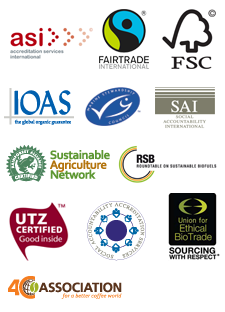 For 2012 and beyond: I have been collaborating with the ISEAL Alliance and its member standards since 2008 when I represented AccountAbility in China and helped organize a meeting in London between standards bodies and some of China’s top trade researchers in a project between the International Institute for Sustainable Development, the Chinese State Council’s Development Research Center, and the Swiss SECO, detailed in the paragraph below.
For 2012 and beyond: I have been collaborating with the ISEAL Alliance and its member standards since 2008 when I represented AccountAbility in China and helped organize a meeting in London between standards bodies and some of China’s top trade researchers in a project between the International Institute for Sustainable Development, the Chinese State Council’s Development Research Center, and the Swiss SECO, detailed in the paragraph below.
I work with the ISEAL Alliance because I foresee that the potent combination of dependable, measurable multi-stakeholder standards, and the tools to bring this information to decision makers will continue to dramatically improve the sustainability of global trade. I advise ISEAL on China because sustainability standards are a crucial aspect of civil governance that provide pathways for China to have its sustainable development efforts recognized in global markets. Additionally, the development of new standards with Chinese participation in setting the “rules of the game” are crucial to China’s soft power and its peaceful integration into a the emerging world order. For more information, you can read the IISD report I co-authored on “Advancing the Sustainability Practices of China’s Transnational Corporations.” (external link).
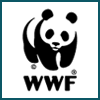
 WWF/USAID: Roundtable on Responsible Live Reef Food Fish Trade in China: I was hired by the WWF Coral Triangle Network Initiative, with support from USAID, to design an initial strategy and work plan that brings together the key business and government stakeholders in mainland China and Hong Kong to improve the sustainability of the trade in live fish from the Coral Triangle region. Greater China’s role, as the largest buyer of this fish (sold mainly in restaurants and hotels), is one key to ensuring that coral ecosystems are protected from overfishing and unsustainable fishing practices.
WWF/USAID: Roundtable on Responsible Live Reef Food Fish Trade in China: I was hired by the WWF Coral Triangle Network Initiative, with support from USAID, to design an initial strategy and work plan that brings together the key business and government stakeholders in mainland China and Hong Kong to improve the sustainability of the trade in live fish from the Coral Triangle region. Greater China’s role, as the largest buyer of this fish (sold mainly in restaurants and hotels), is one key to ensuring that coral ecosystems are protected from overfishing and unsustainable fishing practices.

For 2012 and beyond: Like WWF’s important and game-changing Market Transformations Initiative (see Jason Clay’s inspiring TEDx talk), this project aims to involve companies and governments in protecting shared resources in biodiverse regions. The work is difficult and many existing incentives encourage unsustainable practices, but I always enjoy a challenge, especially when it involves mechanisms for helping China become a more trusted neighbor and regional player. From an economic perspective alone, it may be easy to overlook such a small portion of the overall fish trade value chain, but when you factor in the reputations of hotels, restaurants and greater China itself, I predict that increasing the sustainability of this kind of commodity value chain will become part of China’s charm offensive in the years to come. Other commodities with soft power kudos available for China’s taking? Palm oil, sugar, fish, timber, and soy, to name a few.
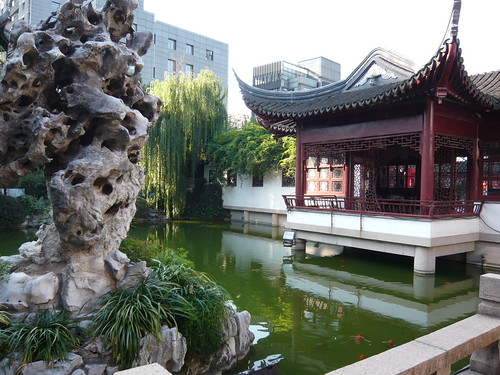
"Tiger Howl Rock" (left) and "Listening to the Rain Pavilion" (right) at Shanghai Confucius Temple, where I taught a class on sustainability and leadership in the Chinese context
 DotEco: Greater China Liaison: DotEco is an innovative project to develop the .eco top-level domain name as a space managed by and for the international environmental community. If the .eco bid is accepted by the internet governance authority, ICANN, .eco would be the first “community-priority” domain name and set a precedent for non-commercial, collaboratively-governed top-level domain names.
DotEco: Greater China Liaison: DotEco is an innovative project to develop the .eco top-level domain name as a space managed by and for the international environmental community. If the .eco bid is accepted by the internet governance authority, ICANN, .eco would be the first “community-priority” domain name and set a precedent for non-commercial, collaboratively-governed top-level domain names.
For 2012 and beyond: I hope that my work to bring on leading Chinese environmental NGOs like the Institute of Public and Environmental Affairs, Friends of Nature, ChinaDialogue, and the Global Environmental Institute helps prove to ICANN that “.eco” is a universally-recognized environmental signifier. I hope that the .eco bid is approved and becomes a new international mechanism to provide accountable, robust, and peer-managed sustainability information on and for organizations around the world. Read more about the project at DotEco.org

Global Leadership Program of Berlitz: facilitator of a pilot executive leadership training program: I was asked to lead a half day session on leadership and sustainable development in the Chinese context. My goal was to change enough hearts and minds of the assembled business executives to at least offset the carbon footprint of my six hours of flying from Chiang Mai to Shanghai. Based on feedback, I think we more than accomplished this, as well as gaining a better understanding about how to achieve success–sustainably–in an Asian context. Many of the pictures in this post of the Shanghai Confucius Temple where I led this leadership session.
For 2012 and beyond: As this was a pilot project, we shall see whether next year takes me to other locals. Teaching a class like this about leading from ones higher ideals was very invigorating and I would relish the opportunity to develop the potential of both myself and others through future sessions in China and elsewhere.
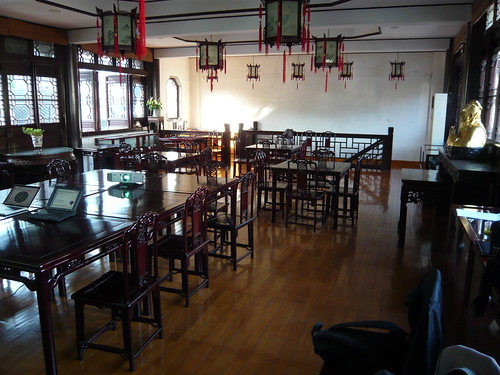
Classroom at the Confucius Temple in Shanghai
 GIZ, International Expert to the German International Cooperation’s Sino-German CSR Project in Beijing: This pilot project was a scoping exercise to develop a platform for exchange on international sustainability standards in China. While standards continue to play greater roles in China’s sustainable development and initial roundtable work was successful, stakeholders were more of the opinion that individual collaborations by standards bodies and stakeholders in China were higher priorities than a platform per se.
GIZ, International Expert to the German International Cooperation’s Sino-German CSR Project in Beijing: This pilot project was a scoping exercise to develop a platform for exchange on international sustainability standards in China. While standards continue to play greater roles in China’s sustainable development and initial roundtable work was successful, stakeholders were more of the opinion that individual collaborations by standards bodies and stakeholders in China were higher priorities than a platform per se.
2012 and beyond: Understanding and acting in China’s unique domestic sustainability standards context and also maximizing the benefits of existing and future sustainability standards to aid China’s sustainable development requires continued research and resources. These twin goals of helping international standards bodies act more strategically in China and helping Chinese standards stakeholders (like farmers/producers, government standards bodies, civil society groups, and private sector actors) remains one of my top professional priorities for the foreseeable future.
 WTO Tribune/Golden Bee: I continue collaborating with the WTO Tribune, one of China’s pioneering corporate social responsibility research, consulting, and policy organizations on a number of projects to increase the sustainability and competitiveness of Fortune 500 enterprises operating in Chinese and international contexts.
WTO Tribune/Golden Bee: I continue collaborating with the WTO Tribune, one of China’s pioneering corporate social responsibility research, consulting, and policy organizations on a number of projects to increase the sustainability and competitiveness of Fortune 500 enterprises operating in Chinese and international contexts.
2012 and beyond: Much has been written and said about the development of corporate social responsibility in China (including by me). I am confident that China’s governmental, private sector, and civil society organizations, including the WTO Tribune, will continue to blend the best of international and domestic theory toward more transparent, accountable, and effective sustainable development practices.
 ChinaDialogue: I authored two pieces for ChinaDialogue, one on “China’s Opportunity to Embrace Sustainability Standards” and the other on Apple’s supply chain practices, “An Open Letter to the Next Steve Jobs.” My writing on Apple was inspired by work by Ma Jun at the Institute of Public and Environmental Affairs on exposing alleged environmental abuses by Apple suppliers.
ChinaDialogue: I authored two pieces for ChinaDialogue, one on “China’s Opportunity to Embrace Sustainability Standards” and the other on Apple’s supply chain practices, “An Open Letter to the Next Steve Jobs.” My writing on Apple was inspired by work by Ma Jun at the Institute of Public and Environmental Affairs on exposing alleged environmental abuses by Apple suppliers.
2012 and Beyond: I continue to be inspired by ChinaDialogue and its collaborators like Ma Jun, along with other environmental pioneers in China, just as I continue to be inspired and amazed by China’s breakneck economic, social and environmental transformations. Apple responded well to the pressure put on it by Chinese NGOs, Chinese and international media, and consumers by holding meetings with many NGOs on how to improve its practices. The media and international NGOs need to continue to put pressure on the electronics sector, which remains far behind in its sustainability action as compared to its technological wow factor. Still, getting a laggard like Apple to improve its practices should be counted as a victory for workers and the environment. But we cannot rest until all living beings on this planet live in dignity and in clean surroundings.
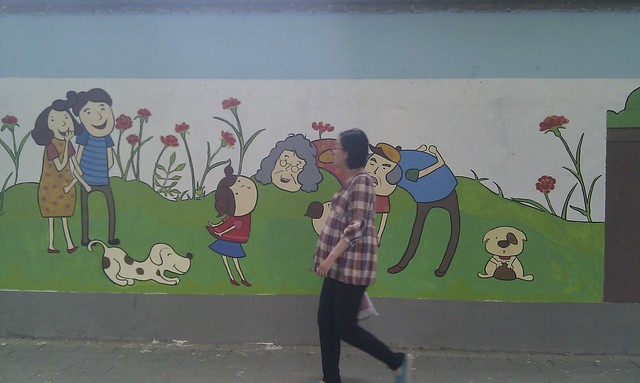
Personal (Projects)
Gardening: I continue to cultivate a garden in the beautiful city of Chiang Mai. I am also helping friends launch a site celebrating the beauty of urban gardens called Urban Micro Garden.
Days as Tramps: I continue to edit the text of Work in Progress, a book that is headed soon to eyes near you, maybe even yours!
Learning Thai: I have begun learning Thai in the one-year course at the Chiang Mai University Language Institute. I am overjoyed with my teacher. If anything, the course is too fast. By the end of the year, we are expected to read, write, and speak Thai fairly well. So far so good!
Puppy: Beaffin the puppy is the newest addition to my family in Thailand.
If you’re still reading, thanks for taking an interest. Now take a deep breath. Are you living a life that is honest to yourself and your ideals? Are you giving your body the nourishment it needs? Are you sharing your appreciation with the people who matter most to you? I hope you take a moment to find your direction and “move confidently in the direction of your dreams.” (Thoreau) Or, as Abraham Lincoln said, “Be sure you put your feet in the right place, then stand firm.”
In closing, I wish all of my collaborators, friends, and allies, along with all who live passionately to give nature a voice in human affairs…
All the best in 2012!
Ok, one last thing…as an Easter egg to fellow Old China Hands, below is a picture from 2010 that you won’t find in the capital. Not that this picture makes “luxury” seem so appealing anyway. (For those non China Hands, Beijing banned “luxury” advertisements in 2011). The depicted image, in truth, isn’t an advertisement, but a partition to a giant housing development that workers had their own uses for!
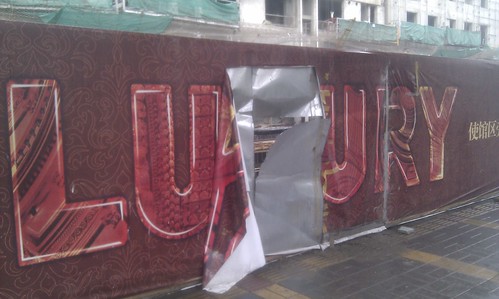
July 5th, 2011 by JJW
“If China grasps the opportunities offered by sustainable certification, it can reap commercial, environmental and social rewards, while helping set the rules for a greener global economy.
International voluntary sustainability standards – such as the Forest Stewardship Council, which certifies sustainably managed forests and forest products – are tools for verifying socially sound and eco-friendly goods and services that play an increasingly important role in global trade. However, they are still relatively new and underused in China. These standards offer Chinese companies, officials and NGOs new ways to take part in setting the rules of the global economy, and a powerful instrument to help the country’s companies gain market rewards for good social and environmental performance. This is a soft-power strategy worthy of attention.”
Continue reading the full article on China Dialogue.
Or read my little explanation here. I feel as if this article hardly should be published with my name alone, for it has been the product of years of research with some of the greatest minds in sustainable development and economics that I have ever had the chance to work with.
The ideas of this article grew out of work I did with Simon Zadek (then Chief Executive of AccountAbility) and Long Guoqiang of the Development Research Center of the Chinese State Council, then vice director of the foreign economics department (now director). When we released the initial copy of our report “Advancing the Sustainable Competitiveness of China’s Transnational Corporations,” (final version here) Isabel Hilton, editor of China Dialogue, asked me to write about it on China Dialogue. In the meantime, I’ve gotten more familiar with the world of certification-based international voluntary sustainability standards and find them especially compelling as sustainable development tools among the panoply of possible approaches. So this China Dialogue article shows my interest in these types of standards. You won’t get a summary of the original research I did with Zadek and Long, but I hope the article does help you understand how sustainability standards are in many ways leading best practices with measurable positive sustainable development impacts that can help underpin China’s ambitions to be a sustainable global power.
August 4th, 2010 by JJW
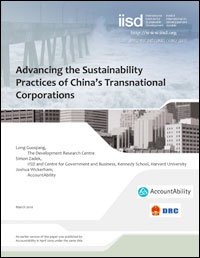 The International Institute for Sustainable Development (IISD) has published the final version of a paper I co-wrote with Simon Zadek and Long Guoqiang as part of a multi-year “sustainable trade strategy for China” with multiple stakeholders from China and abroad, supported by the Swiss SECO.
The International Institute for Sustainable Development (IISD) has published the final version of a paper I co-wrote with Simon Zadek and Long Guoqiang as part of a multi-year “sustainable trade strategy for China” with multiple stakeholders from China and abroad, supported by the Swiss SECO.
As IISD writes on its website,
“This paper examines how the Chinese business community can best use international sustainability standards to enhance its competitiveness in global markets, in so doing more effectively placing themselves on a sustainable economic path. We highlight the opportunity for Chinese businesses, supported by enabling public policies, to become a force in shaping the next generation of sustainability standards in global markets as a competitive strategy consistent with China’s broader interests. Doing this requires Chinese actors to engage more deeply in existing standards initiatives and take a more explicit role among the communities that have developed and now govern these standards. Effective engagement in such standards is a means of offsetting competitive disadvantages or creating competitive advantages when businesses and nations choose a more sustainable development path. This paper sets out both strategic options for businesses and policy options for the Chinese government to realize sustainable development and competitiveness goals.” —IISD Publications Centre
This is the final version of a paper launched a year earlier by AccountAbility, which I posted about here.
Download the final paper here.

 I’d like to share what I’ve been working on in 2011, along with some inspiring thoughts for 2012 and beyond.
I’d like to share what I’ve been working on in 2011, along with some inspiring thoughts for 2012 and beyond. The ISEAL Alliance: Advising on China Engagement and Sustainability Information Transparency: I continue to advise the
The ISEAL Alliance: Advising on China Engagement and Sustainability Information Transparency: I continue to advise the  For 2012 and beyond: I have been collaborating with the ISEAL Alliance and its member standards since 2008 when I represented
For 2012 and beyond: I have been collaborating with the ISEAL Alliance and its member standards since 2008 when I represented 
 WWF/USAID: Roundtable on Responsible Live Reef Food Fish Trade in China: I was hired by the
WWF/USAID: Roundtable on Responsible Live Reef Food Fish Trade in China: I was hired by the 

 DotEco: Greater China Liaison:
DotEco: Greater China Liaison: 

 GIZ, International Expert to the German International Cooperation’s Sino-German CSR Project in Beijing: This pilot project was a scoping exercise to develop a platform for exchange on international sustainability standards in China. While standards continue to play greater roles in China’s sustainable development and initial roundtable work was successful, stakeholders were more of the opinion that individual collaborations by standards bodies and stakeholders in China were higher priorities than a platform per se.
GIZ, International Expert to the German International Cooperation’s Sino-German CSR Project in Beijing: This pilot project was a scoping exercise to develop a platform for exchange on international sustainability standards in China. While standards continue to play greater roles in China’s sustainable development and initial roundtable work was successful, stakeholders were more of the opinion that individual collaborations by standards bodies and stakeholders in China were higher priorities than a platform per se. WTO Tribune/Golden Bee: I continue collaborating with the WTO Tribune, one of China’s pioneering corporate social responsibility research, consulting, and policy organizations on a number of projects to increase the sustainability and competitiveness of Fortune 500 enterprises operating in Chinese and international contexts.
WTO Tribune/Golden Bee: I continue collaborating with the WTO Tribune, one of China’s pioneering corporate social responsibility research, consulting, and policy organizations on a number of projects to increase the sustainability and competitiveness of Fortune 500 enterprises operating in Chinese and international contexts. ChinaDialogue: I authored two pieces for ChinaDialogue, one on “
ChinaDialogue: I authored two pieces for ChinaDialogue, one on “


